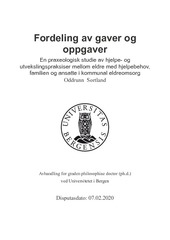| dc.description.abstract | This thesis examines how elderly people in need of care and their families make adjustments in their everyday lives, and how they interact and negotiate with employees in municipal elderly care. Care for elderly and ill people has traditionally been a concern of the family, but is today the legal responsibility of public authorities and professionals in the Nordic countries. Nevertheless, inherited norms require that the family should help and support elderly family members. A distinguishing feature of the family as an institution is the lifelong exchange that takes place between its members. In some periods of life, family members are mainly recipients of different forms of help and support, and in other, givers. In the relationship between care recipients and professional care-givers, the state and municipalities work as intermediary and guarantor to ensure that care recipients receive legally-based care, and that professional caregivers receive financial compensation for their work. This study centres on eight elderly people in need of care, living at home, and receiving care from both home-care nursing and family members, primarily due to physical impairment. Data was collected through research interviews, conversations and observations with and of elderly care recipients, close family members, and employees in different units of municipal elder care in two municipalities, which represented an urban and a rural context. The purpose of the study is to understand and explain how care practices materialize in the family, and in interaction with professional carers. The thesis' theoretical perspective is based on Pierre Bourdieu's theory of practice and Marcel Mauss's gift exchange theory. The study has been conducted in a praxeological research tradition, where the practices are analyzed against the background of objective and subjective conditions, as a basis for theory construction. Analysis of data material shows that family members perceived motivations for caring are based on emotions such as love, care and obligation. In this study, the family as an institution is perceived as a social construction, where experiences and motives are also shaped by structures and discourses in the surrounding community. Within the families, members interact in complex ways, which are explored through the eight family case studies. Analysis of empirical data shows that care practices in the family are linked to past and present exchanges of various forms of tangible and symbolic gifts, family members' embodied patterns of action and social position in relation to each other, and their interest in social reproduction of the family. Other matters of importance are geographical proximity, health status, their own family situation and family members' obligations as employees elsewhere. Carer satisfaction is higher when gratitude is received, and family members are drawn to situations where they receive gratitude as opposed to situations where their care is not appreciated. The relationship between professional caregivers and care recipients is regulated through national law and administrative control. Professional caregivers act as the government's extended arm, and enforce the municipalities’ legal duty to provide services to citizens who are entitled to receive care under specified criteria. Employees, by virtue of their position, provide services to people with disabilities, regardless of the quality of their relationship. They are, however, like other citizens of the community affected by the response they receive. Municipal service provision is based on universal principles for assessing care needs, regardless of the extent and forms of recipients' capital. In the meetings between professional caregivers, care recipients and their family, it is first and foremost the symbolic capital and the reputation of the family that have an impact on the social practices that take place. This is, among other factors, based on how they relate to their own situation and how they interact with employees in the services. Analysis of empirical data shows that care recipients and families who adopt an active and solution-oriented attitude to their own situation, using their own available resources to be as independent as possible in their everyday lives, achieve a form of symbolic capital and advantageous reputation in the health and care services. Care receivers and family members who respond to professional caregivers actions with positive symbolic expressions such as trust, recognition and gratitude achieve better qualitative care in the short term, but also in the long term, which materializes in goodwill and thoughtfulness beyond the specific care assignment professional caregivers are to perform. | en_US |
